Replacing books, militarisation and 'conversations about important things'. How Russia is changing the identities of Ukrainian children under occupation
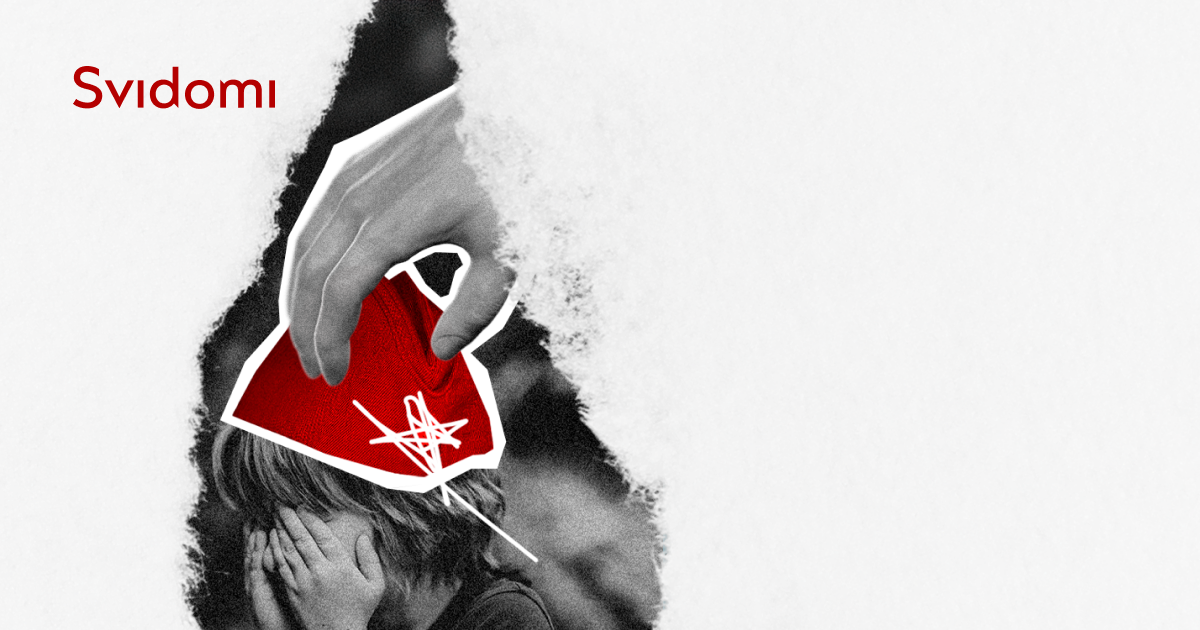
Children born in 2018 turn six this year and prepare to go to school. They don't know what Ukraine is like when there is no war and no occupied territories. When Russia began its full-scale invasion, these children were 3-4 years old. Their memories of Ukraine and Ukrainian identity have not yet taken hold, and the whole system of education and upbringing in the temporarily occupied territories is ready to displace them and impose a Russian identity completely.
Read the article to learn how Russia is doing this and who should be punished: the political leadership or the teachers.
'Crimean scenario'
Since 2014, the Russians and the occupying administrations have systematically destroyed the Ukrainian education system in the territories under their control. While parts of the Luhansk and Donetsk regions remained in the status of unrecognised 'republics', the Russians immediately and illegally declared the Crimean peninsula a subject of the Russian Federation.
The Russians developed the scenario of transition to Russian education in Crimea over eight years. After 2022, they used it in the partially occupied territories of the Zaporizhzhia and Kherson regions.
The Almenda Centre for Civic Education, which deals with children and their education under occupation, notes that the 'Crimean scenario' for the destruction of Ukrainian education is as follows:
- complete transition to Russian education standards;
- replacement of educational materials with Russian ones;
- replacement of teaching staff with those 'loyal' to the new government;
- absence of teaching of Ukrainian Studies subjects, such as the History of Ukraine, Ukrainian Language and Literature;
- limiting the study of the Ukrainian language;
- militarisation of the educational process (cadet schools, the youth National Military Patriotic Social Movement Association 'Yunarmiya', 'Bolshaya Peremena').
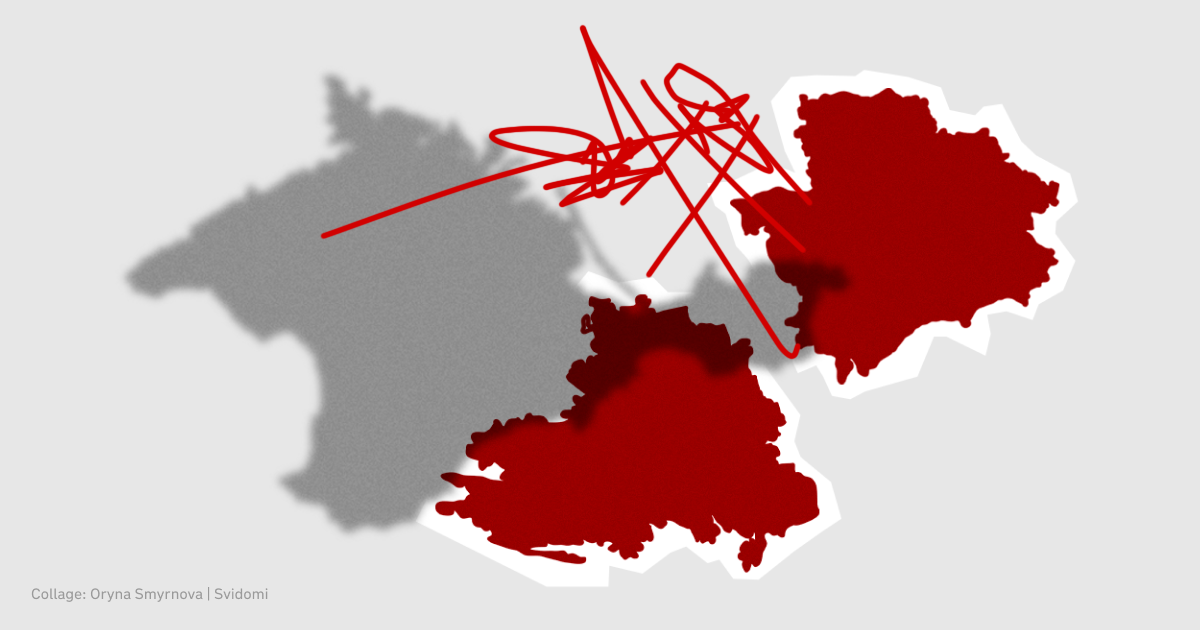
"They were conducting a so-called experiment. They were looking at how to implement Russian standards to change Ukrainian identity, indoctrinate and militarise. After the full-scale invasion, they (the temporarily occupied territories of Zaporizhzhia and Kherson regions — ed.) went the same way in just six months as the occupied Crimea went in eight years," says Oleh Okhredko, an expert at Almenda, in an interview with Svidomi.
The system of identity change
Almenda has tracked and systematised the mechanisms and forms by which Russia is destroying the Ukrainian identity of children in the temporarily occupied territories. These forms include formal and non-formal education and youth movements, including militarised ones.
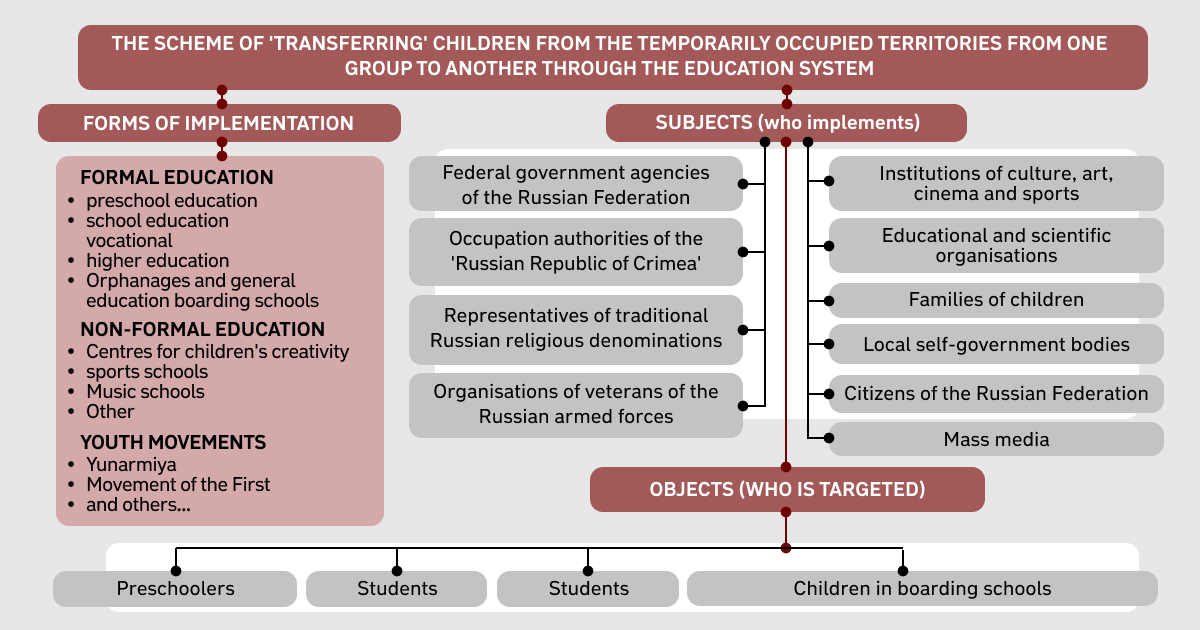
Oleh Okhredko says that to reach all the children who remained in the occupation, the Russians and the occupation 'administrations' used 'carrot and stick' methods: they offered one-off and monthly payments for a child to go to a Russian school, and representatives of the Russian authorities began to visit families whose children were not at school on September 1 when the school years started. Collaborators and armed men often accompanied them.
The Russians and the occupation 'authorities' immediately destroyed Ukrainian-language textbooks. In some places, they were physically destroyed by burning them in the yard.
Educational institutions are constantly 'tested for loyalty'. Primary school children are questioned about what their parents say at home. Gadgets are checked for Ukraine-related content.
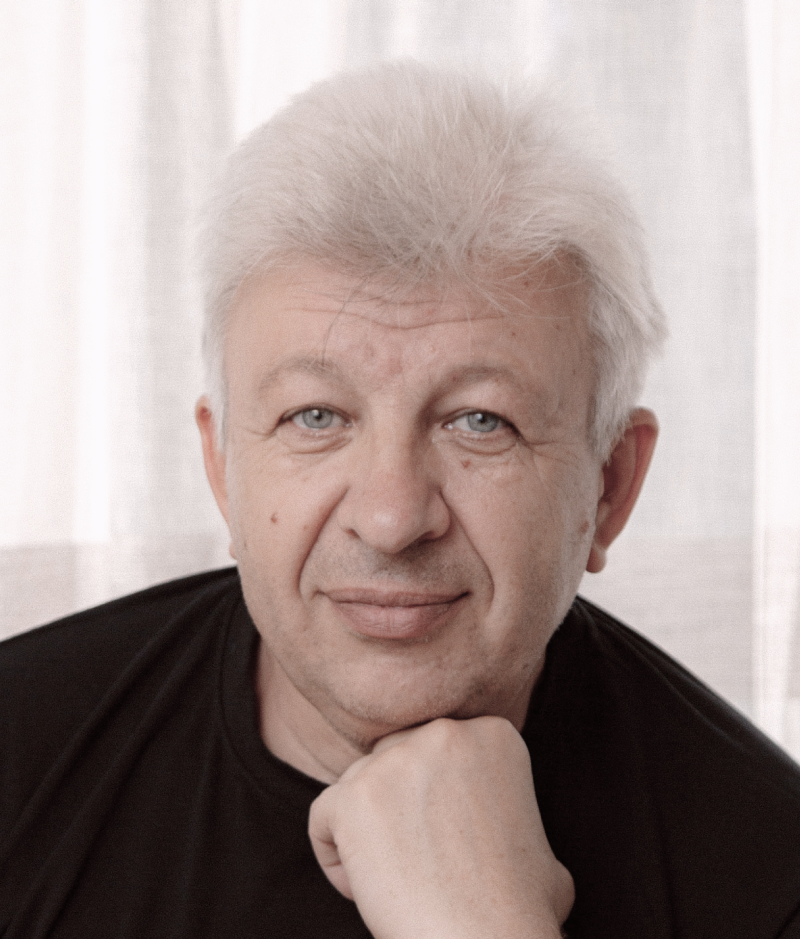
"They are also trying to destroy the remnants of distance education that still exist in the occupied territories of the Kherson and Zaporizhzhia regions, where children study remotely in Ukrainian schools. Teachers who work there can be taken to the basement ("taking to the basement" is a form of detention and torture of Ukrainians by Russians in the occupied territories — ed.). I have heard of several such cases. On the one hand, they give them their uniforms. On the other hand, they are under direct pressure,"
says Almenda's expert.
Teachers
The teachers underwent retraining in the temporarily occupied Crimea. Oleh Okhredko notes that in Yevpatoriia (Crimea), the teachers were trained by representatives of Moscow. Although there is a prominent teacher training institute in Crimea, 'the Crimeans themselves were not entrusted with the training of these teachers'.
Initially, there was a shortage of teachers. According to Almenda, there were 3-4 sports or handicrafts lessons a day in some villages because there was no one to teach them. In the beginning, the salaries of the teachers who cooperated with occupation ‘administrations’ were high. But now, as in the Crimea scenario, they are much lower, and there are delays.
Because many teachers did not go to work in schools in the temporarily occupied territories, the Russians tried to import teachers from other areas. The 'Zemsky Teacher' programme was introduced. Under this programme, teachers from the Russian Federation are paid substantial sums of money and provided with accommodation and high salaries.
"Sometimes there are jokes, for example, when a group of teachers from Dagestan (a region of Russia located near the Caspian Sea and the Caucasus Mountains — ed.) start teaching different subjects in Melitopol. There is a video of a teacher with a certain accent making mistakes while teaching Russian philology," says Okhredko.
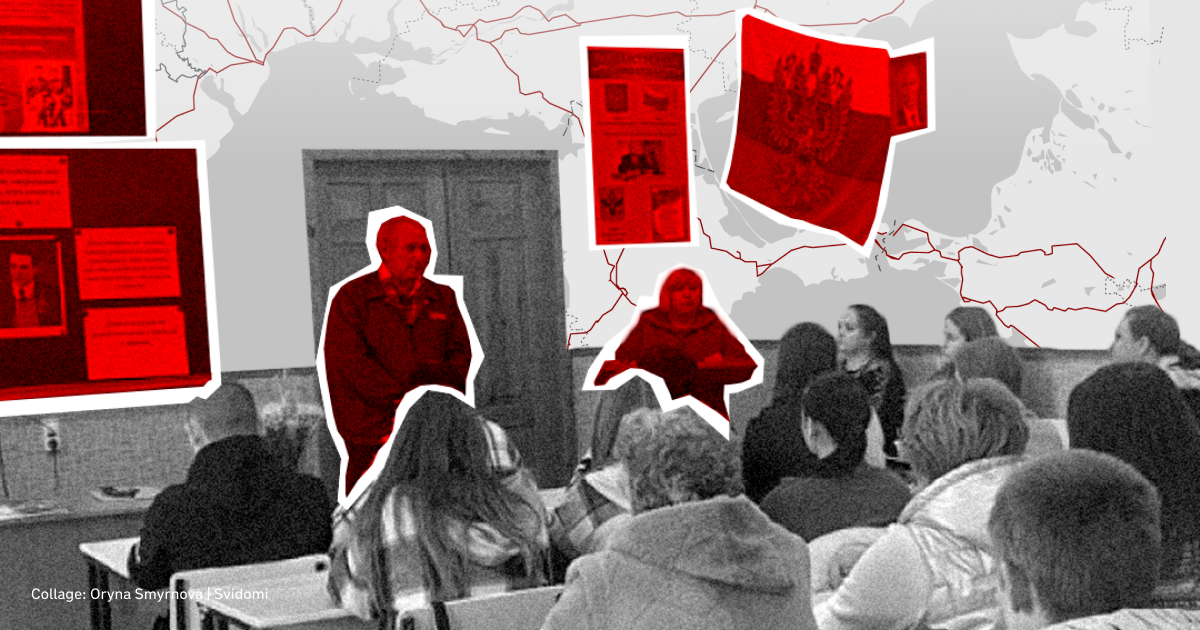
Educational work
The children begin each school week by raising the flag and singing the national anthem of the Russian Federation under the supervision of their teachers. There are also posters and displays of Russian propaganda everywhere.
There are regular events related to the Second World War. May 9, when Russia celebrates Victory Day over Nazis, is the culmination of these events. The celebration includes painting windows, visiting veterans, and handing out St George's ribbons and parades. All events are often accompanied by military personnel or veterans of the Russian war against Ukraine.
They have also introduced events that did not exist before. These are the so-called weekly political briefings — 'Conversations about Important Things'. At first, they were voluntary, but later they became compulsory.
Almenda's expert notes that this is similar to the Soviet principle. Still, political information was 'left to teachers', and now we can talk about a centralised approach that considers children's age characteristics when developing scenarios for teachers to conduct these activities.
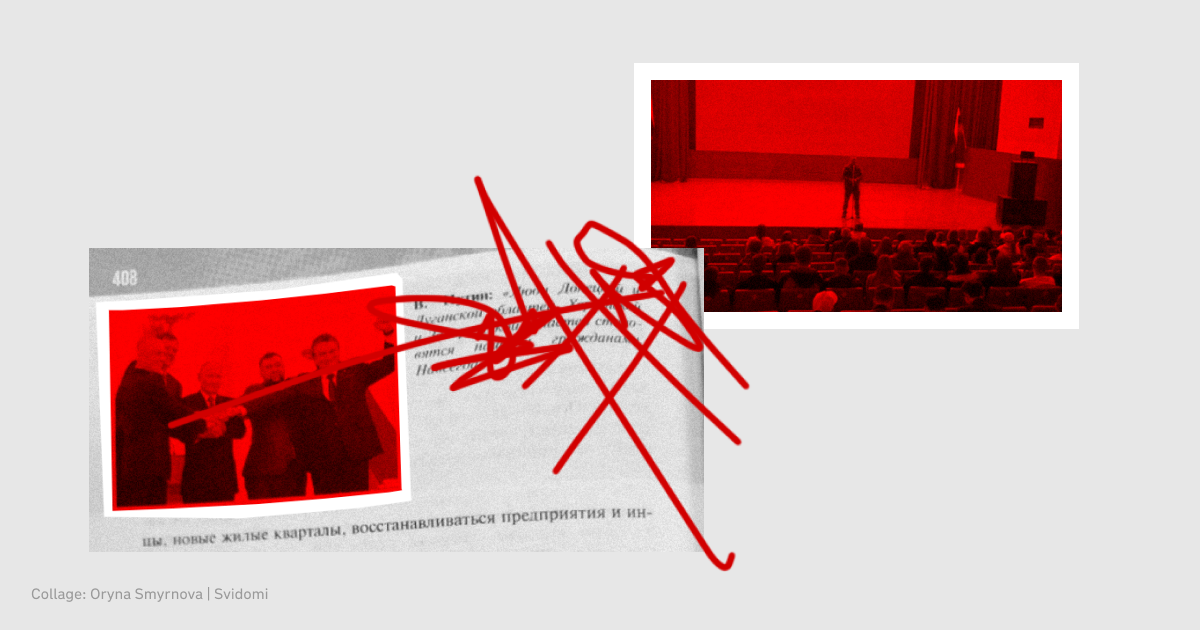
"The whole educational process is based on the transition to Russian identity. They are trying not only to destroy Ukrainian identity but to instil hatred of everything Ukrainian through militarisation and indoctrination. This is being done mainly through the humanities, but even the study of exact sciences is being introduced with a Russian character," says Oleh Okhredko.
In 2023, the Russian Federation has earmarked 67 billion rubles (around $783 million) for patriotic education. Nineteen billion ($222 million) will go to the 'Movement of the First', founded at the end of 2022.
In 2024, organisations are expected to spend almost 20.5 billion rubles (nearly $240 million). By comparison, 10 billion rubles (around $117 million) have been earmarked for children's healthcare in 2024.
According to Almenda's estimates, there were more than 20 national and local children's youth organisations in the occupied part of the Zaporizhzhia region. For example, the so-called 'Young Traffic Inspectors' and 'Young Firefighters' were re-established from Soviet times. A separate youth organisation, 'Young South' ('Yug Molodoy' — ed.), was created specifically for the Zaporizhzhia region.
The aforementioned 'Movement of the First' was created directly under Putin's leadership in Moscow. At its inception, Russian Enlightment Minister Sergei Kravtsov personally travelled to Henichesk, where he opened the first branch.
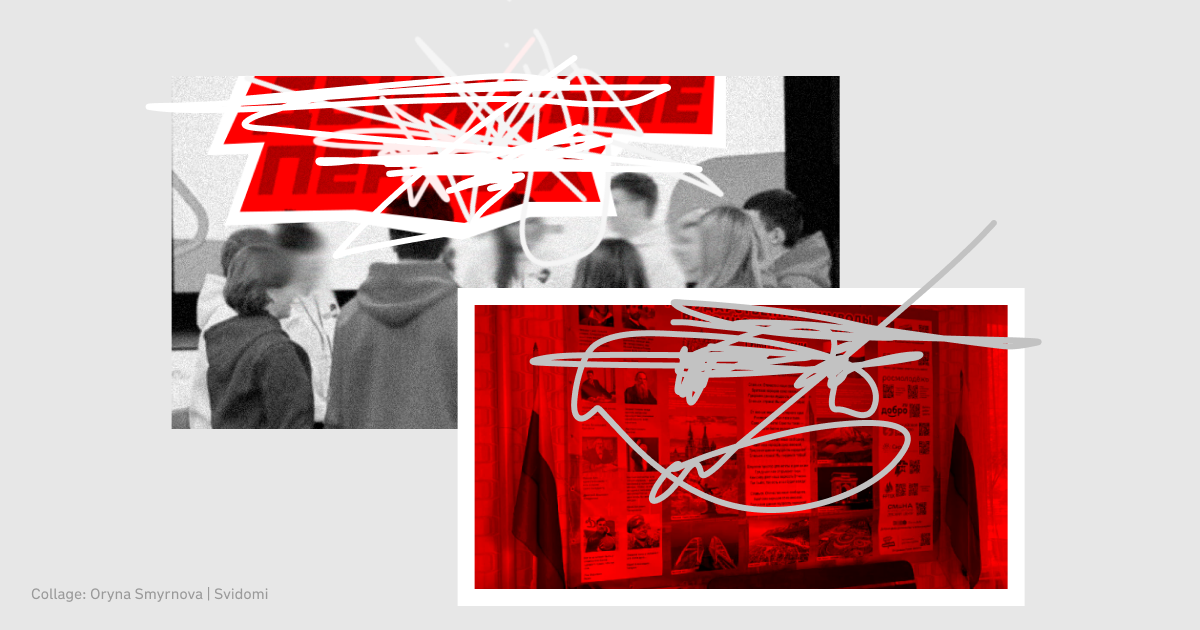
"This is a mass organisation whose main task is to promote the 'Russian way of life', including militarisation. They are bringing back militarised games from the Soviet era. Back then, the war game 'Zarnitsa' was popular, and now there is 'Zarnitsa 2.0', which is run by the Movement of the First. This movement is trying to cover all areas. Following the example of the Soviet system, this movement has created the 'Eaglets of Russia' (Orliata Rossii) programme for primary school children," says Oleh Okhredko.
The Russians are actively using 'holiday camps' to re-educate children. In 2022, they started taking children to Crimea who had not been returned to their parents. And this continues to this day. Nowadays, the camps are often used to hold militarised events. 'Artek', for example, hosts congresses of future commanders.
The camps in the Zaporizhzhia and Kherson regions are also being used, for example, the 'Red Carnation' ('Chervona Hvozdyka' — ed.) in Berdiansk, which was merged with 'Artek' to give it a status. It plans to create so-called military centres on its own. For example, the Patriot Centre, where children live for more than a month in an entirely military environment.
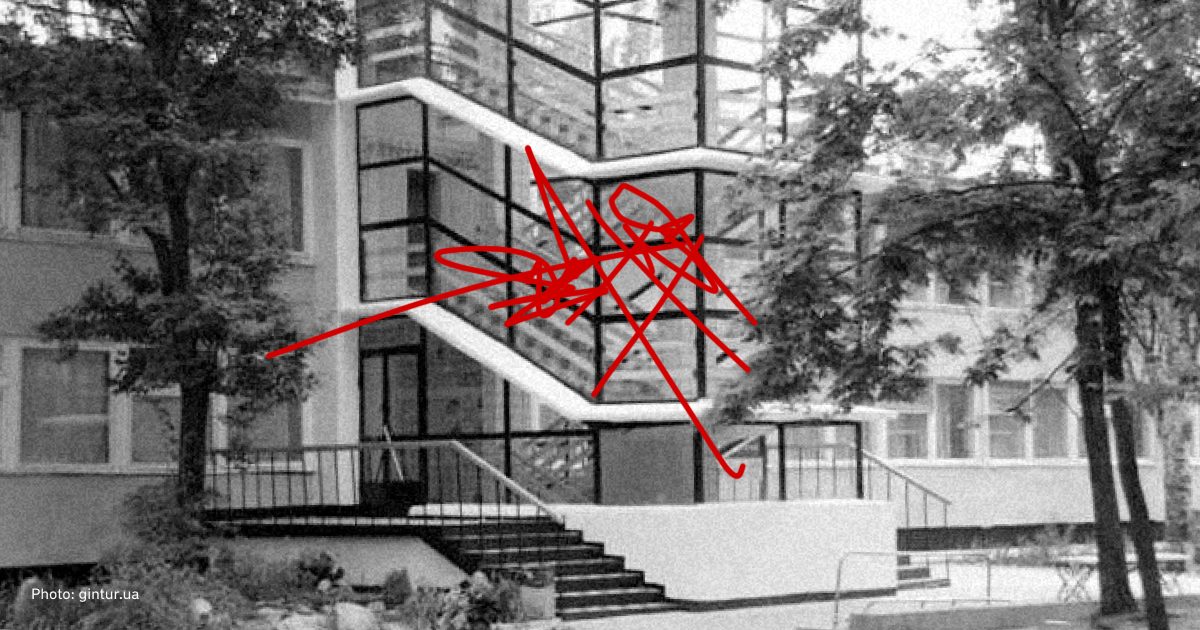
Militarisation
Militarisation was not only a part of the camp's recreational activities. The Russians and the occupation administration began introducing so-called 'cadet classes', a form of education in which children were taught military skills from the first class onwards. Classes had already been set up in Henichesk and Skadovsk.
However, one of the first such serious organisations was the Yunarmiya, created on the Russian Ministry of Defence initiative. The first branch of the Yunarmiya was ostentatiously opened in Sevastopol in 2016.
Children who join the Yunarmiya are subjected to severe moral pressure. It is a fully militarised organisation, but often, children are even bribed with material support. Children are given a complete set of clothing, from stockings to berets and caps. The cost of this set is now up to 30,000 rubles ($353). This includes both winter and summer clothing. This has severe implications for children from low-income families. Tens of thousands of children are already members of these organisations.
The use of youth organisations is attractive to secondary school children, and the unstable mental state of children is not ready for resistance based on memories.
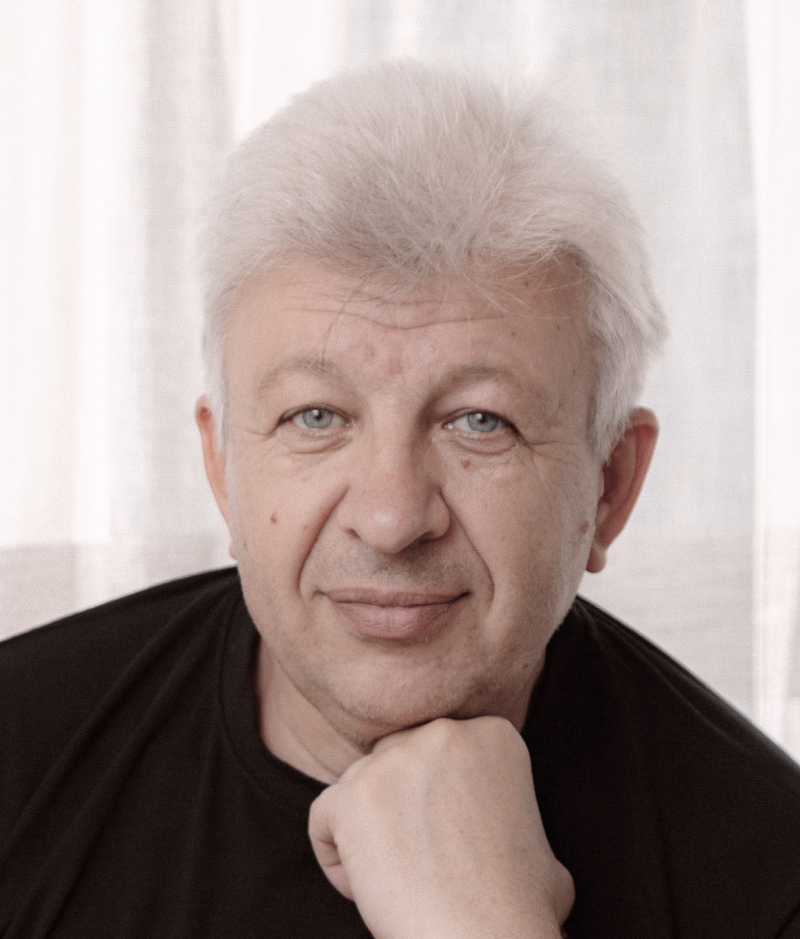
"Youth organisations are used to destroy identity itself. Firstly, propaganda creates the concept of an enemy to fight. And this enemy is you and me (Ukrainians — ed.). And secondly, the issue of children's self-sacrifice is used. It went so far as to say that just before the liberation of Kherson by Ukrainian troops, the solemn creation of this army took place, and at night, they carried this flag through the streets of Kherson,"
says Okhredko.
The Almenda expert notes that while children used to work with dummy weapons, they are now using modern weapons, modern assault rifles and grenades.
"The so-called 'Kerch shooter' (Vladislav Roslyakov, a suspect in the mass murder of October 17, 2018. The explosion and shooting killed 21 people and injured 67 others — ed.) is a teenager who was trained in the Yunarmiya, learned how to use firearms, and then took a rifle and went to shoot children in Kerch," says Oleh Okhredko.
Pre-school education
Pre-school children have virtually no memory of Ukraine, and the Russians and the occupation 'authorities' are already working to ensure that children identify themselves as Russian. To this end, they are beginning to create so-called 'cells' in kindergartens.
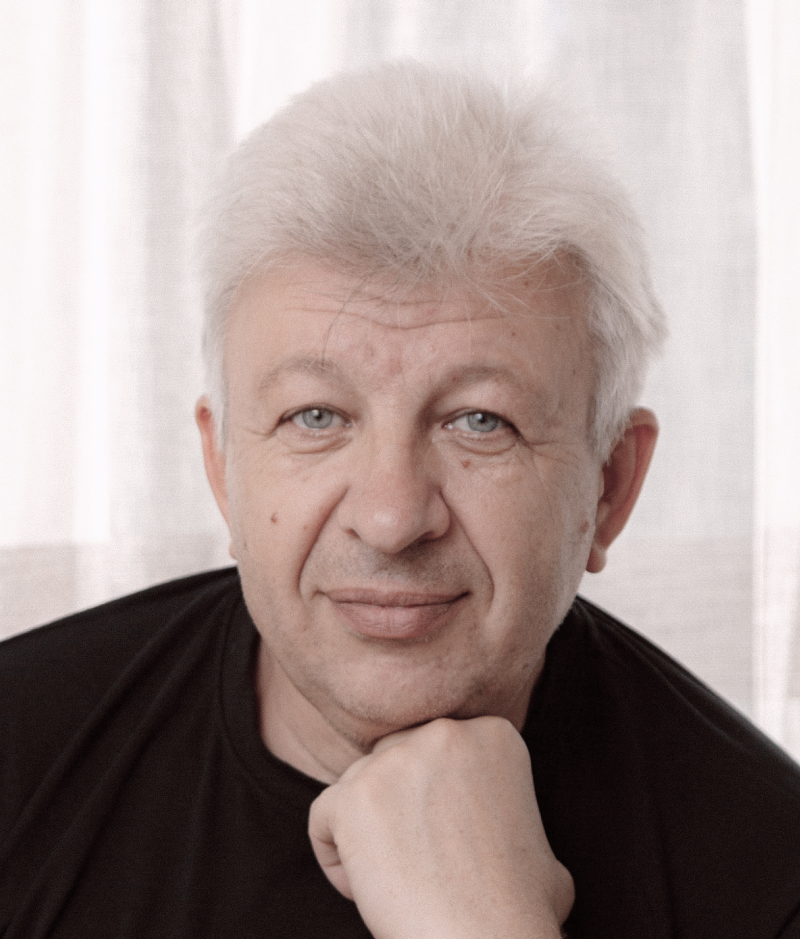
"Pre-school education is a separate, serious area where children's memories are destroyed [and] Russian identity is imposed: from events with painted teachers in kokoshniks and sundresses (Russian traditional clothes and headdresses — ed.)to 'parades' where children are dressed in military uniforms,"
says Okhredko.
Higher education
Following the Crimean example, the Russians merged the universities into one large one in Melitopol (Zaporizhzhia region). But then they separated them, so there are now universities in Melitopol and Berdiansk. However, the Russians are encouraging children from the temporarily occupied territories to apply to Russian universities and are creating advantages for them.
There is a system called University Changes, where children from the temporarily occupied territories are brought to Russia for ten days to attend a university. Almenda estimates that more than 100 universities have accepted more than 20,000 children in two years. The geography covers cities from Moscow to Vladivostok near Japan.
Bringing to justice
Kateryna Rashevska, a lawyer with the Regional Centre for Human Rights (RCHR), says in a comment for Svidomi that the right to preserve identity (Article 8 of the Convention on the Rights of the Child) is considered the core of all other rights.
"This means that when the Russian Federation and its agents interfere with a child's Ukrainian national identity, they are impeding the realisation of all other rights of the child under the Convention," Rashevska comments.
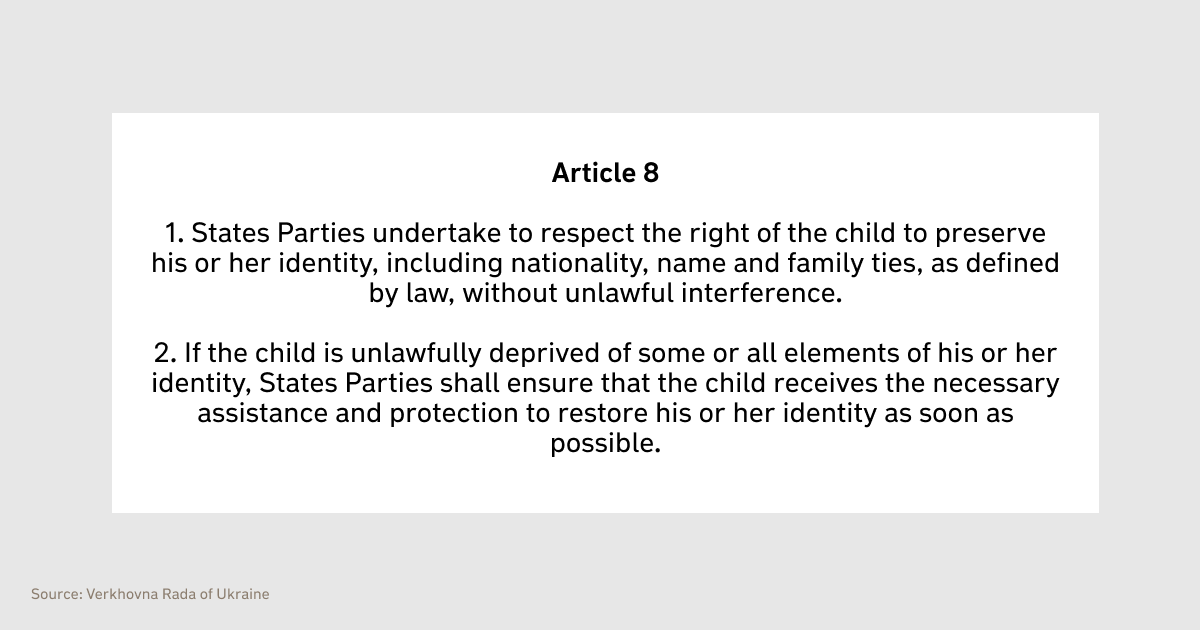
The lawyer explains that in international law, Russia's actions can be defined as a crime against humanity and discriminatory persecution. It is being carried out on two grounds: age (children) and nationality (Ukrainians).
The actions of the Russian Federation are systematic: we are talking about the eradication of identity, both through the formal and non-formal education system and in the so-called 're-education camps'. This is a whole network of institutions that are accountable to different subjects of the Russian Federation and receive funds from different budgets: federal, regional and local occupation budgets.
It is also possible to invoke violations of international humanitarian law. This is Article 50 of the Geneva Convention relative to the Protection of Civilian Persons in Time of War. When it comes to militarisation, this is Article 51.
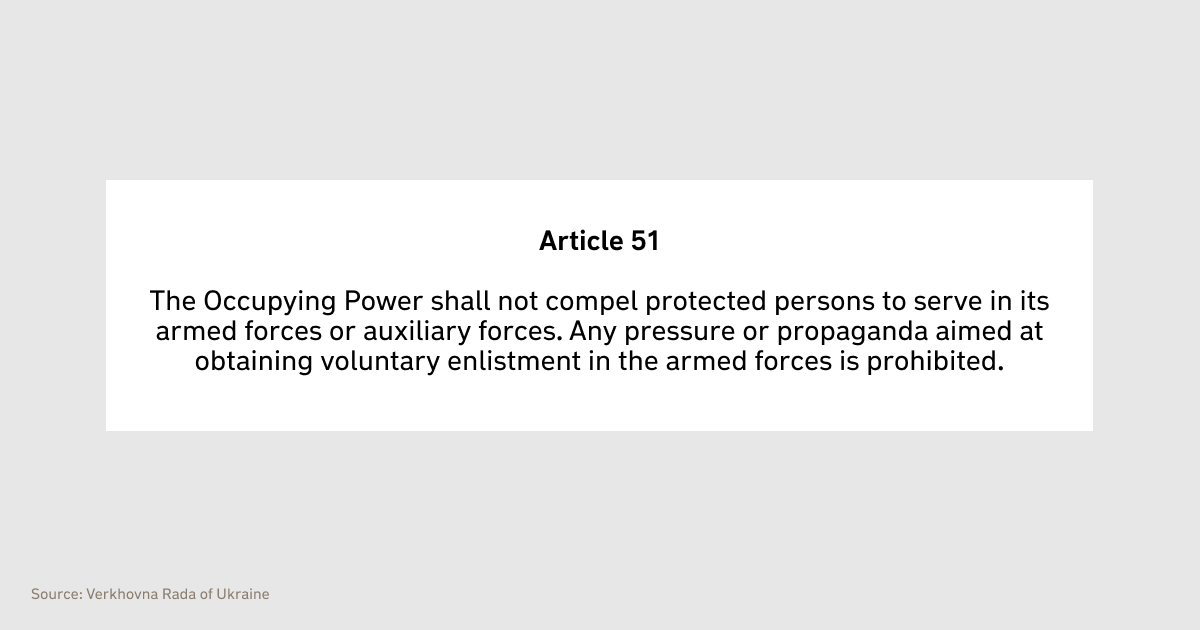
"Certain acts constitute grave violations of the rights of the child as defined in Security Council resolutions. In particular about recruitment. When we talk about children being abducted, the definition of abduction includes the purpose of political indoctrination. This means that we can qualify such actions at the international level," explains Kateryna Rashevska.
In February 2024, the International Court of Justice ruled that the lack of access to Ukrainian-language education in the occupied Crimean peninsula was a violation of the UN Convention on the Elimination of All Forms of Racial Discrimination.
The lawyer explains that it is much more difficult to qualify these crimes at the national level. Ukraine has not ratified the Rome Statute and has no article on crimes against humanity in its national criminal code. However, relevant bills have been submitted to the Verkhovna Rada of Ukraine for voting and discussion. One has already been adopted but is awaiting the President's signature.
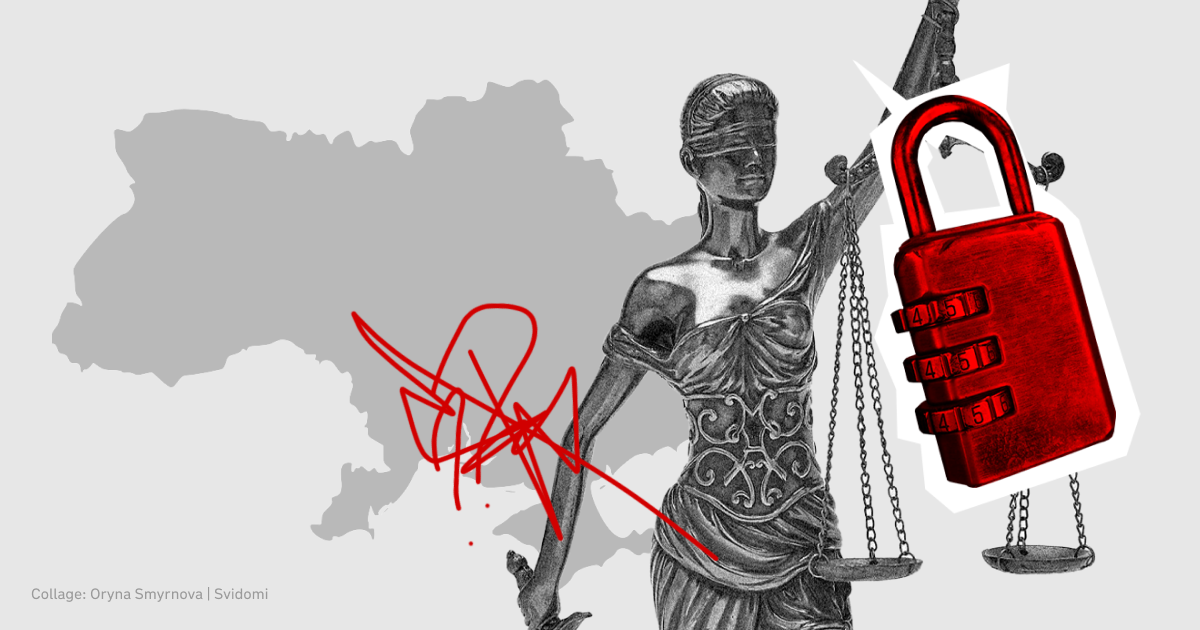
"This limits us considerably because there is no discriminatory prosecution in national criminal law. The Office of the Attorney General is trying to develop some innovations to prosecute this. This is good because the Office of the Prosecutor General cannot ratify the Rome Statute — that is not its competence, but it can prosecute unlawful acts. So, some strategy development is a step and an understanding that these practices need to be stopped and punished somehow. But how to do that under national law is a big question," says Kateryna Rashevska.
The only thing we are allowed to punish to some extent under Article 438 of the Criminal Code of Ukraine (violation of the laws and customs of war) is propaganda for service in the armed forces of the opposing state. However, this violation does not reach the threshold of a war crime or meet international standards.
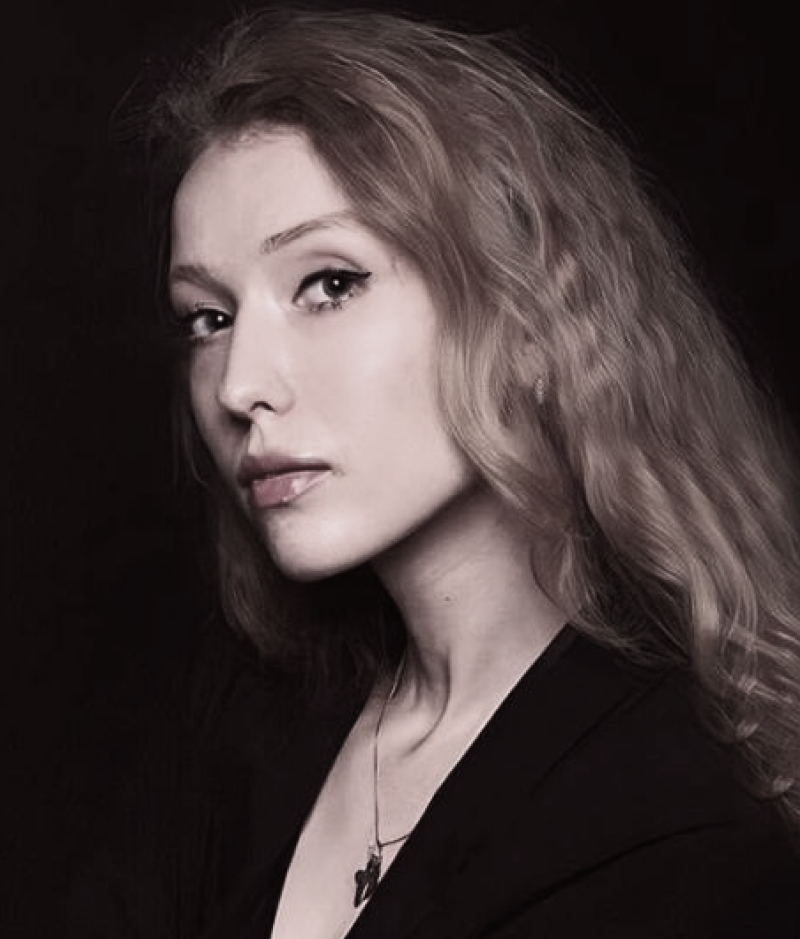
"There may be a situation where these actions are classified as one thing at the level of the International Criminal Court but differently in national law. And this has nothing to do with the law but state policy,"
warns Rashevska.
One can try to look for signs of genocide in the changing identities of Ukrainian children. But even if Ukraine were to initiate criminal proceedings that would qualify acts aimed at erasing national identity as the crime of genocide, it is doubtful that they would be enforced in foreign jurisdictions. In this case, the victims will not be able to receive compensation.
"The spread of the Russian curriculum in schools in the occupied territories is not in itself genocide. You will not find a material [legal] element under which you can put these programmes and re-education in general. But it will testify to the existence of special intent. Therefore, considering everything in the complex, together with the deportations of Ukrainian children and the imposition of Russian citizenship, we may have additional qualifications in the arrest warrants or at further stages of the case. But given the current circumstances, this idea seems more and more illusory to me," comments the Regional Centre for Human Rights lawyer.
Who should be punished?
Oleh Okhredko says that those who give or transmit orders at the highest level should be held accountable without question. As for teachers, he says it's a case-by-case matter, and the contribution and intent must be assessed in each case.
"As far as I know, Ukraine wants to punish those who organised this policy in the first place. That is absolutely logical, and I support that strategy. Because it is one thing to punish a teacher who simply sowed Russian propaganda and forced children to write letters as members of the SMO (Russia calls the invasion of Ukraine a special military operation — ed.), and quite another to punish the Minister of Education of the Russian Federation [Sergey] Kravtsov," says Kateryna Rashevska.
She agrees that teachers should be assessed on a case-by-case basis.
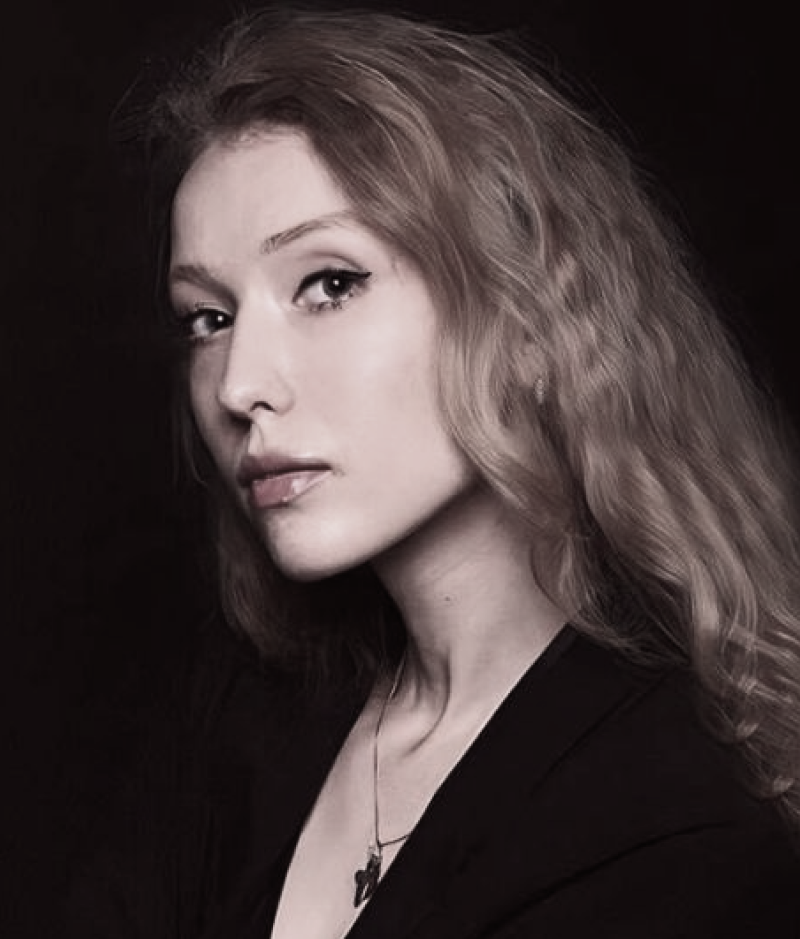
"In general, we need to think about whether such a punishment (imprisonment of collaborating teachers — ed.) is appropriate given how many war crimes we have in general related to Russian aggression, what capacity we have in penitentiary institutions and judges, and why we need to overload them with cases about one teacher. Some other extra-judicial mechanisms, such as lustration or preventing this person from working with children, can work just as effectively,"
the lawyer explains.
She argues that the people who organise this system should be punished. Those responsible, she says, include President Vladimir Putin and his administration; the Commissioner for Children's Rights, Maria Lvova-Belova; the Yunarmiya's ideological inspirer, former Russian Defence Minister Sergei Shoigu; a network of governors who, as sponsoring regions, engage in 'children's recreation' but in reality re-education in Russian camps; a significant number of Russian federal subjects that provide funding, organise and encourage the arrival of children; and regional children's ombudsmen.
"They have built up a whole system. I think it ends with the so-called ministries of education in the occupied territories. As far as principals and teachers are concerned, other issues and instruments of responsibility can be raised there. I don't think it's necessary to initiate criminal proceedings every time. On a case-by-case basis, we should only look for cases where the intent is undeniable and there is sufficient evidence," concludes Kateryna Rashevska, a Regional Centre for Human Rights (RCHR) lawyer.


